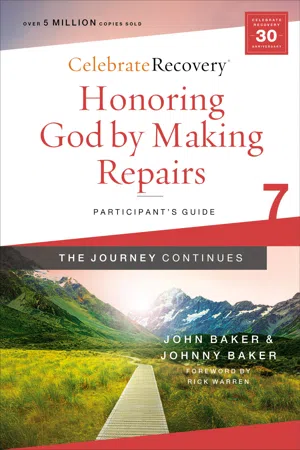
Honoring God by Making Repairs: The Journey Continues, Participant's Guide 7
A Recovery Program Based on Eight Principles from the Beatitudes
- 80 pages
- English
- ePUB (mobile friendly)
- Available on iOS & Android
Honoring God by Making Repairs: The Journey Continues, Participant's Guide 7
A Recovery Program Based on Eight Principles from the Beatitudes
About This Book
Celebrate Recovery introduces The Journey Continues—four new participant's guides designed as a revolutionary, new second step study curriculum. This step study is taken after completing The Journey Begins (Participant Guides 1-4). In the seven lessons in Guide 7: Honoring God by Making Repairs, you will experience Christ-centered and biblically based studies filled with brand new acrostics, deeper questions, and more helpful Bible verses. The content in Guide 7 will focus on a deeper study of principles 4-6 of the recovery process:
- O penly examine and confess my faults to God, to myself, and to someone I trust. "Happy are the pure in heart" (Matthew 5: 8).
- V oluntarily submit to every change God wants to make in my life and humbly ask Him to remove my character defects. "Happy are those whose greatest desire is to do what God requires" (Matthew 5: 6).
- E valuate all my relationships. Offer forgiveness to those who have hurt me and make amends for harm I've done to others, except when to do so would harm them or others. "Happy are the merciful" (Matthew 5: 7). "Happy are the peacemakers" (Matthew 5: 9).
By working through the lessons and exercises found in each of the four participant's guides of The Journey Continues you will find a deeper sense of true peace and serenity, continue to restore and develop stronger relationships with others and with God, and find deeper freedom from life's hurts, hang-ups, and habits.
Frequently asked questions
Information
Lesson 16
AMENDS

Principle 6: Evaluate all my relationships. Offer forgiveness to those who have hurt me and make amends for harm I’ve done to others, except when to do so would harm them or others.
“Happy are the merciful.” (Matthew 5:7)
“Happy are the peacemakers.” (Matthew 5:9)
Step 8: We made a list of all persons we had harmed and became willing to make amends to them all.
“Do to others as you would have them do to you.” (Luke 6:31)

How do I make amends the way God tells us to?
Who do I need to make new amends to?
Which amends were incomplete or not done at all when I did this lesson in The Journey Begins?
AMENDS
A — Admit the hurt and the harm
M — Make a list
E — Encourage one another
N — Not just for those we hurt
D — Do it at the right time
S — Start living all the promises of God — again
Table of contents
- Cover Page
- Title Page
- Copyright Page
- Ebook Instructions
- Contents
- Foreword
- Introduction
- The Road to Recovery: Eight Principles Based On the Beatitudes
- Twelve Steps and Their Biblical Comparisons
- Serenity Prayer
- Celebrate Recovery’s Small Group Guidelines
- Lesson 12: Confess
- Lesson 13: Admit
- Lesson 14: Ready
- Lesson 15: Victory
- Lesson 16: Amends
- Lesson 17: Forgiveness
- Lesson 18: Grace
- Afterword